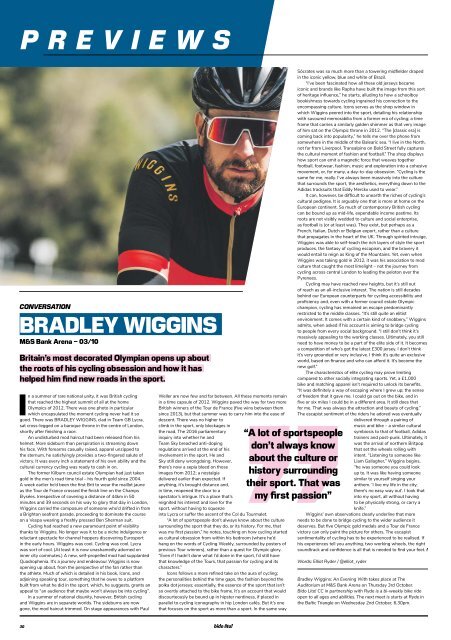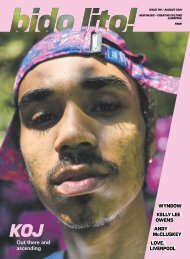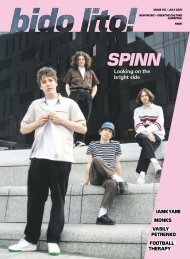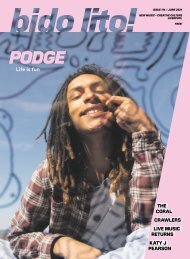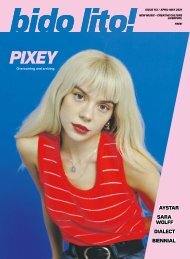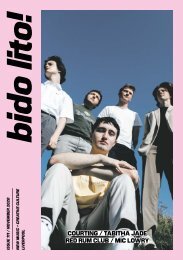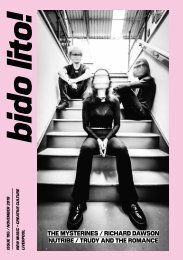Issue 104 / October 2019
October 2019 issue of Bido Lito! magazine. Featuring: STRAWBERRY GUY, MARVIN POWELL, COMICS YOUTH, RICHARD HERRING, BRADLEY WIGGINS, ENNIO THE LITTLE BROTHER, EDWYN COLLINS, SKELETON COAST, WAND, FUTURE YARD and much more.
October 2019 issue of Bido Lito! magazine. Featuring: STRAWBERRY GUY, MARVIN POWELL, COMICS YOUTH, RICHARD HERRING, BRADLEY WIGGINS, ENNIO THE LITTLE BROTHER, EDWYN COLLINS, SKELETON COAST, WAND, FUTURE YARD and much more.
You also want an ePaper? Increase the reach of your titles
YUMPU automatically turns print PDFs into web optimized ePapers that Google loves.
PREVIEWS<br />
CONVERSATION<br />
BRADLEY WIGGINS<br />
M&S Bank Arena – 03/10<br />
Britain’s most decorated Olympian opens up about<br />
the roots of his cycling obsession and how it has<br />
helped him find new roads in the sport.<br />
In a summer of rare national unity, it was British cycling<br />
that reached the highest summit of all at the home<br />
Olympics of 2012. There was one photo in particular<br />
which encapsulated the moment cycling never had it so<br />
good. There was BRADLEY WIGGINS, clad in Team GB Lycra,<br />
sat cross-legged on a baroque throne in the centre of London,<br />
shortly after finishing a race.<br />
An undisturbed mod haircut had been released from his<br />
helmet. More sideburn than perspiration is streaming down<br />
his face. With forearms casually raised, apparel unzipped to<br />
the sternum, he satisfyingly provides a two-fingered salute of<br />
victory. It was every inch a statement of his own ability and the<br />
cultural currency cycling was ready to cash in on.<br />
The former Kilburn council estate Olympian had just taken<br />
gold in the men’s road time trial – his fourth gold since 2004.<br />
A week earlier he’d been the first Brit to wear the maillot jaune<br />
as the Tour de France crossed the finish line on the Champs<br />
Elysées. Irrespective of covering a distance of 44km in 50<br />
minutes and 39 seconds on his way to glory that day in London,<br />
Wiggins carried the composure of someone who’d drifted in from<br />
a Brighton seafront parade, proceeding to dominate the course<br />
on a Vespa wearing a freshly pressed Ben Sherman suit.<br />
Cycling had reached a new paramount point of visibility<br />
thanks to Wiggins. No longer was it to be a niche indulgence or<br />
reluctant spectacle for channel hoppers discovering Eurosport<br />
in the early hours. Wiggins was cool. Cycling was cool. Lycra<br />
was sort of cool. (At least it is now unashamedly adorned on<br />
inner city commutes.) A new, self-propelled mod had supplanted<br />
Quadrophenia. It’s a journey and endeavour Wiggins is now<br />
opening up about, from the perspective of the fan rather than<br />
the athlete. Much of which is detailed in his book, Icons, and<br />
adjoining speaking tour, something that he owes to a platform<br />
built from what he did in the sport, which, he suggests, grants an<br />
appeal to “an audience that maybe won’t always be into cycling”.<br />
In a summer of national disunity, however, British cycling<br />
and Wiggins are in separate worlds. The sideburns are now<br />
gone, the mod haircut trimmed. On stage appearances with Paul<br />
Weller are now few and far between. All these moments remain<br />
in a time capsule of 2012. Wiggins paved the way for two more<br />
British winners of the Tour de France (five wins between them<br />
since 2013), but that summer was to carry him into the ease of<br />
descent. There was no higher to<br />
climb in the sport, only blockages in<br />
the road. The 2016 parliamentary<br />
inquiry into whether he and<br />
Team Sky breached anti-doping<br />
regulations arrived at the end of his<br />
involvement in the sport. He and<br />
Sky still deny wrongdoing. However,<br />
there’s now a sepia bleed on those<br />
images from 2012; a nostalgia<br />
delivered earlier than expected. If<br />
anything, it’s brought distance and,<br />
in time, reopened the door to a<br />
spectator’s intrigue. It’s a place that’s<br />
reignited his interest and love for the<br />
sport, without having to squeeze<br />
into Lycra or suffer the ascent of the Col du Tourmalet.<br />
“A lot of sportspeople don’t always know about the culture<br />
surrounding the sport that they do, or its history. For me, that<br />
was my first passion,” he notes, touching on how cycling started<br />
as cultural obsession from within his bedroom (where he’d<br />
hang on the words of Cycling Weekly, surrounded by posters of<br />
previous Tour winners), rather than a quest for Olympic glory.<br />
“Even if I hadn’t done what I’d done in the sport, I’d still have<br />
that knowledge of the Tours, that passion for cycling and its<br />
characters.”<br />
Icons follows a more refined take on the aura of cycling;<br />
the personalities behind the time gaps, the fashion beyond the<br />
polka dot jerseys; essentially, the essence of the sport that isn’t<br />
so overtly attached to the bike frame. It’s an account that would<br />
discourteously be bound up in hipster nerdiness, if placed in<br />
parallel to cycling iconography in hip London cafés. But it’s one<br />
that focuses on the sport as more than a sport. In the same way<br />
“A lot of sportspeople<br />
don’t always know<br />
about the culture or<br />
history surrounding<br />
their sport. That was<br />
my first passion”<br />
Sócrates was so much more than a towering midfielder draped<br />
in the iconic yellow, blue and white of Brazil.<br />
“I’ve been fascinated how all these old jerseys became<br />
iconic and brands like Rapha have built the image from this sort<br />
of heritage influence,” he starts, alluding to how a schoolboy<br />
bookishness towards cycling ingrained his connection to the<br />
encompassing culture. Icons serves as the shop window in<br />
which Wiggins peered into the sport, detailing his relationship<br />
with savoured memorabilia from a former era of cycling; a time<br />
frame that carries a similarly golden shimmer as that very image<br />
of him sat on the Olympic throne in 2012. “The [classic era] is<br />
coming back into popularity,” he tells me over the phone from<br />
somewhere in the middle of the Balearic sea. “I live in the North,<br />
not far from Liverpool. Transalpino on Bold Street fully captures<br />
the cultural moment of fashion and football.” The shop displays<br />
how sport can emit a magnetic force that weaves together<br />
football, footwear, fashion, music and exploration into a cohesive<br />
movement, or, for many, a day-to-day obsession. “Cycling is the<br />
same for me, really. I’ve always been massively into the culture<br />
that surrounds the sport, the aesthetics, everything down to the<br />
Adidas tracksuits that Eddy Merckx used to wear.”<br />
It can, however, be difficult to unearth the riches of cycling’s<br />
cultural pedigree. It is arguably one that is more at home on the<br />
European continent. So much of contemporary British cycling<br />
can be bound up as mid-life, expendable income pastime. Its<br />
roots are not visibly wedded to culture and social enterprise,<br />
as football is (or at least was). They exist, but perhaps as a<br />
French, Italian, Dutch or Belgian export, rather than a culture<br />
that propagates in the heart of the UK. Through spirited intruige,<br />
Wiggins was able to self-teach the rich layers of style the sport<br />
produces, the fantasy of cycling escapism, and the bravery it<br />
would entail to reign as King of the Mountains. Yet, even when<br />
Wiggins was taking gold in 2012, it was his association to mod<br />
culture that caught the most limelight – not the journey from<br />
cycling across central London to leading the peloton over the<br />
Pyrenees.<br />
Cycling may have reached new heights, but it’s still out<br />
of reach as an all-inclusive interest. The nation is still decades<br />
behind our European counterparts for cycling accessibility and<br />
proficiency and, even with a former council estate Olympic<br />
champion, cycling has remained an escape predominantly<br />
restricted to the middle classes. “It’s still quite an elitist<br />
environment. It comes with a certain kind of snobbery,” Wiggins<br />
admits, when asked if his account is aiming to bridge cycling<br />
to people from every social background. “I still don’t think it’s<br />
massively appealing to the working classes. Ultimately, you still<br />
need to have money to be a part of the elite side of it. It becomes<br />
a competition of who’s got the latest £300 jersey. I don’t think<br />
it’s very grounded or very inclusive. I think it’s quite an exclusive<br />
world, based on finance and who can afford it. It’s become the<br />
new golf.”<br />
The characteristics of elite cycling may prove limiting<br />
compared to other socially integrating sports. Yet, a £1,000<br />
bike and matching apparel isn’t required to unlock its benefits.<br />
“It was definitely a way of escaping where I grew up; the sense<br />
of freedom that it gave me. I could go out on the bike, and in<br />
five or six miles I could be in a different area. It still does that<br />
for me. That was always the attraction and beauty of cycling.”<br />
The escapist sentiment of the riders he adored was eventually<br />
delivered through a pairing of<br />
music and bike – a similar cultural<br />
symbiosis to that of football, Adidas<br />
trainers and post-punk. Ultimately, it<br />
was the arrival of northern Britpop<br />
that set the wheels rolling with<br />
intent. “Listening to someone like<br />
Liam Gallagher,” Wiggins begins,<br />
“he was someone you could look<br />
up to. It was like having someone<br />
similar to yourself singing your<br />
anthem. ‘I live my life in the city,<br />
there’s no easy way out’. I took that<br />
into my sport, all without having<br />
to be physically strong, or carry a<br />
knife.”<br />
Wiggins’ own observations clearly underline that more<br />
needs to be done to bridge cycling to the wider audience it<br />
deserves. But five Olympic gold medals and a Tour de France<br />
victory can only paint the picture for others. The escapist<br />
sentimentality of cycling has to be experienced to be realised. If<br />
his experiences tell you anything, two working wheels, the right<br />
soundtrack and confidence is all that is needed to find your feet. !<br />
Words: Elliot Ryder / @elliot_ryder<br />
Bradley Wiggins: An Evening With takes place at The<br />
Auditorium at M&S Bank Arena on Thursday 3rd <strong>October</strong>.<br />
Bido Lito! CC in partnership with Ryde is a bi-weekly bike ride<br />
open to all ages and abilities. The next meet is starts at Ryde in<br />
the Baltic Triangle on Wednesday 2nd <strong>October</strong>, 6.30pm.<br />
30


